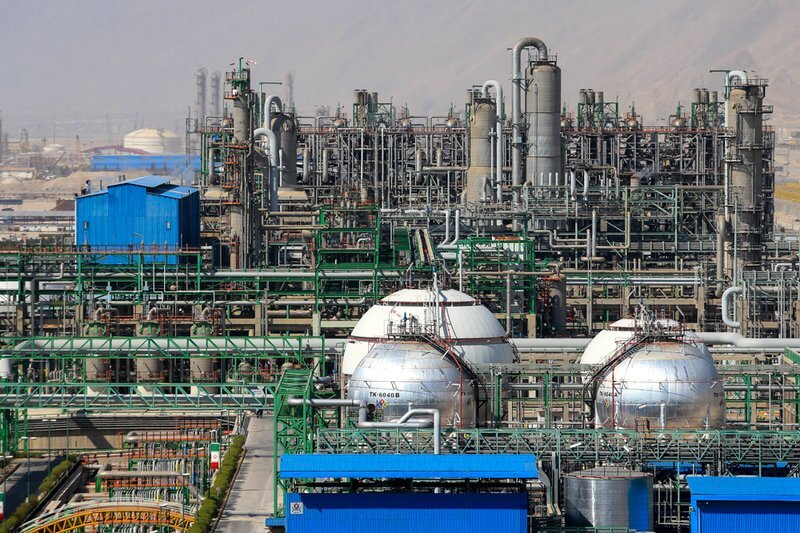Annual petchem output to rise 35% by Mar. 2021

TEHRAN- Iran’s annual petrochemical production will increase 35 percent in the current Iranian calendar year (ends on March 20, 2021), according to the managing director of National Petrochemical Company (NPC).
Making the remarks on Wednesday on the sidelines of his visit to the different units of one of the petrochemical complexes in the country, Behzad Mohammadi said that the operation of 16 petrochemical projects in the current year will increase the production capacity of the petrochemical industry by 35 percent, Mehr news agency reported.
He pointed to the plan of increasing the production capacity of propylene in the smartening process of the petrochemical industry and put the current production capacity of propylene in the country at more than 950,000 tons.
Presently, the country is facing a shortage of propylene and for this reason, planning has been made for increasing production capacity of propylene in petrochemical industry, he stated.
“We have targeted production of 12 strategic products from propylene in the current year, based on which the demand of downstream industries will be met” he added.
Iran has been facing a shortage of propylene for years. The country’s propylene production in the Iranian calendar year 1404 (March 2025-March 2026) will be four percent of its total petrochemical production.
It is while this figure will be 18 percent worldwide, 21 percent in China, 17 percent in the United States, and 16 percent in Saudi Arabia.
Currently, with the production of 985,000 tons of propylene by Iranian refineries and petrochemical plants, there is a shortage of 175,000 tons of this product in the country, Shana has reported.
In the calendar year of 1404, the amount of propylene production will reach 1.95 million tons, while Iran will be facing an annual shortage of about 700,000 tons of the item.
In order to tackle this projected shortage, the first step is to launch projects with methanol and propylene output.
Propylene is a colorless fuel gas with a naturally pungent smell. Although similar to propane, it has a double bond which gives it a combustion advantage i.e. it burns hotter. This fuel gas is extremely flammable and non-toxic. Propylene is obtained during the refining of gasoline.
Projects worth over $11b to be inaugurated
The deputy oil minister further pointed out that 16 petrochemical projects, valued at over $11 billion, will be put into operation in the current year.
Elsewhere in his remarks, he called the current year as a prosperous and golden year for Iran’s petrochemical industry and added, “according to the scheduled program, a number of 16 petrochemical projects will be inaugurated by yearend but it is likely that three to four of these projects would be put into operation with delay due to the outbreak of coronavirus pandemic.”
The official had said last week that making the petrochemical industry smart is the only way for a stable presence in the global markets.
Making the remarks in an interview conducted by Shana, Mohammadi reiterated, “In the petrochemical sector we should have a global view.”
He also emphasized moving in the way of attracting more investors to this industry.
The official further mentioned the production of petrochemical products in the past Iranian calendar year (ended on March 19) and said, “Last year was a successful year in terms of petrochemical production, there was no problem in this due, and the projected annual output was achieved.”
According to Mohammadi, the petrochemical industry is not like the oil industry and it is practically unsanctionable.
“For oil, the ways of selling and the costumers are specific and limited but that is not the case with petrochemicals. There are hundreds of holdings which are eager for buying our diverse petrochemical products”, the official has told the Tehran Times in a press conference on the sidelines of the 24th Iran International, Oil, Gas, Refining and Petrochemical Exhibition (Iran Oil Show 2019).
“However, we are holding meetings with our customers to explore various aspects of possible impacts of the U.S. sanctions on our trade", he added.
As the second-biggest source of revenue for Iran, the petrochemical industry is one of the most important pillars of the country’s resilient economy and one of the main suppliers of foreign currency especially the euro for the country.
The industry became more significant since the re-imposition of U.S. sanctions on the country’s oil industry and since then, the government has been taking serious measures to expand the industry and move toward self-sufficiency.
Cooperating with capable domestic knowledge-based companies and startups is one of the very fruitful steps that the oil ministry has taken in its efforts to reach complete independence from the foreign resources for meeting its equipment needs.
In this regard, the country’s Petrochemical Research and Technology Company (PRTC) has played a very significant role in collaborating with such companies for working on innovative research projects for producing various equipment and base-products needed in the industry.
